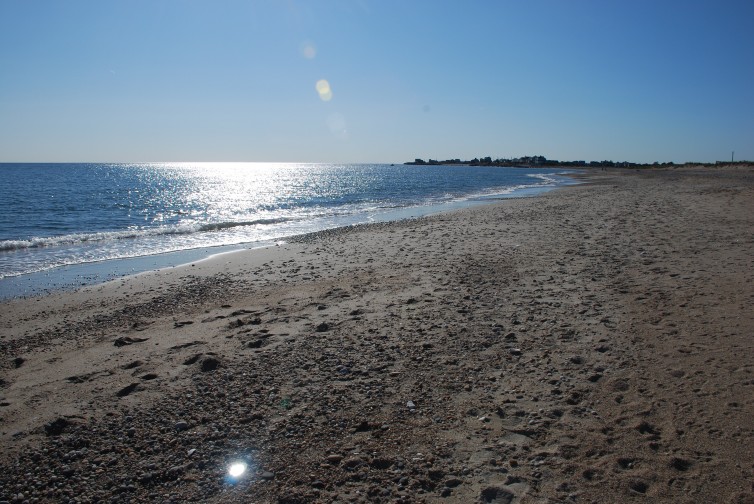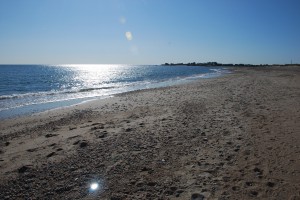In our work to prod forward the effort to regain the full “shore privileges” guaranteed by our Rhode Island Constitution, we have brought up several points which have received support from everyone with whom we have spoken. Namely:
- A close look at the Ibbison (1982) ruling ends with the justice finding Mr. Ibbison innocent (the now infamous Ibbison Case), and states that in the future it would be impossible to convict anyone of trespass walking along the water’s edge because no one knows where the defining “Metonic high tide line” is located.
- The constitutional re-write (1986) does not mention anything about tides, and leaves the argument wheeling around the meaning of the word “shore” and its location on the landscape.
- The voting on the R.I. constitution wording was a referendum presented to the citizens, and it passed easily. With we citizens only knowing the common definition of “shore” as being “the land bordering a large body of water”, we the voters set the common definition of shore as the fact in the matter.
Though supportive, several people from the law, academic, and state agency rosters had a repeating challenge to item number three above. Their well taken point was that, if the state had clearly defined the meaning of “shore” somewhere in the voting process as being only below the high tide line, there would be no further argument.
We were challenged to investigate any and all information made available to the public as part of the referendum process to see if the citizens were, in fact, ever informed that the privileges of the shore existed only below a tide dependent reference point. Metaphorically speaking… we picked up the gauntlet.
- From Caroline Karp at Brown we got the Justinian Code and the annotated version of the RI Constitution.
- From cardboard boxes at the archives of the Sectary of State ( thanks Ken Carlson) we got the original voting booth placard, the voter’s handbook, and the companion voter’s guide. One of these noted that the individual “constitutional committee reports were available (in 1986) at your local library” if people cared to view them.
- From Glen at the RI State Library we learned that there is no record of such reports, but that boxes of paper constitutional documents were sent to the Special Collections branch of the Providence College library.
- From the cardboard boxes at the PC Special Collections, Robin Raincourt got us the committee reports and the committee summary findings.
We have gone through them all, and:
- The voting public was never presented with a definition of “shore” that differed from the commonly held one of it being dry land next to the water. We citizens voted to accept the new wording of our constitution using the definition we brought into the booth in our heads.
- Not only is there no mention of our rights existing only below the high tide line, there are numerous, repeated, and explicit declarations that the high tide line is not to be used as an arbiter, and that citizen’s rights exist above that line.
Below you will find some quotes of relevant passages from these documents:
Beyond Ibbison Supportive Information
From the Justinian Code (The Roman Legal foundation 0f the Public Trust Doctrine) :
- “By the law of nature these things are common to mankind—the air, running water, the sea, and consequently the shores of the sea. No one, therefore, is forbidden to approach the seashore…”
- “The seashore extends as far as the greatest winter flood runs up.”
- “The public use of the seashore, too, is part of the law of nations, as is that of the sea itself; and, therefore, any person is at liberty to place on it a cottage, to which he may retreat, or to dry his nets there, and haul them from the sea; for the shores may be said to be the property of no man but are subject to the same law as the sea itself, and the sand or ground beneath it.”
From the RI Constitution:
- “…and in furtherance of the protection of the rights of the people to enjoy and freely exercise the rights of fishery and the privileges of the shore, as those rights and duties are set forth in Section 17, shall be an exercise of the police powers of the state, shall be liberally construed, and shall not be deemed to be a public use of private property.”
From the Annotated RI Constitution:
- “The committee also considered clarifying the definition of the term “shore” as used in the Constitution. After long deliberation, the committee left the definition of the term “shore” for judicial determination.” (Ibbison had already been decided. The convention did not recognize that as a final analysis)
From the constitutional committee report:
- “Adoption of the “mean high tide mark” as a categorical boundary between the public and private usages would in many instances abrogate expanded rights of passage or uses which may have historically developed by prescription or dedication and the committee declined such a -limitation. Instead the term “shore” has been left undefined for judicial determination based upon the circumstances of each case. Future determinations are to be made on a case by case basis upon a factual, legal and historical analysis concerning dedications and public usages which may extend the rights of the public above the “mean high tide mark”.”
From the constitutional committee findings:
- “It is equally clear that the public has, for many years, used and enjoyed portions of many littoral owners’ properties.”
- “The use of the term “shore” is not intended to be narrowly construed to mean only the area below the mean high tide mark.”
- “The Convention considered alternative definitions of the term “shore, ” including mean high tide, vegetation line, high water mark, wash line, among others, and rejected each as not being applicable to the variety of situations and traditional uses which exist along the hundreds of miles of Rhode Island shoreline.”
- “No private littoral property owner may restrict or interfere with a citizen’s shore rights notwithstanding any historical interference with those rights.”
From the voting booth placard for a yes/no vote:
- “SHORE USE AND ENVIRONMENTAL PROTECTION- Shall rights of fishery and privileges of the shore be described and shall the powers of the state and local government to protect those rights and the environment be enlarged? Shall the regulation of land and waters for these purposes not be deemed a public use of private property? “ (67% YES)

